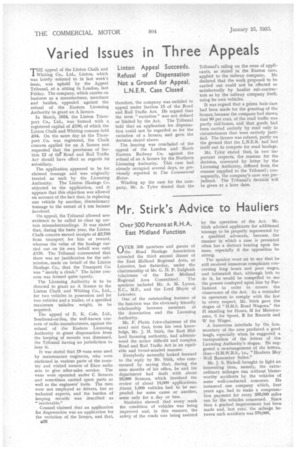Varied Issues in Three Appeals
Page 44

If you've noticed an error in this article please click here to report it so we can fix it.
Linton Appeal Succeeds. Refusal of Dispensation Not a Ground for Appeal. L.N.E.R. Case Closed THE appeal of the Linton Chalk and Whiting Co., Ltd., Linton, which was briefly .referred to in last week's issue, was upheld by the Appeal Tribunal, at a sitting in London, last Friday. The company, which carries on business as a manufacturer, merchant and haulier, appealed against the refusal of the Eastern Licensing Authority to grant an A licence.
In March, 1934, the Linton Transport CO., Ltd., was formed with a registered capital of £100, of which the Linton Chalk and Whiting concern held £94. On the same day ag the Transport Co. was registered, the Chalk concern applied for an A licence ana requested that the provisions of Section 12 of the' Road and Rail Traffic Act should have effect as regards its subsidiary.
The application appeared to be for claimed tonnage and was originally treated as such by the Licensing Authority. The Linton Haulage Co. objected to the application, and it appears that this objection was allowed on account of the fact that, in replacing one vehicle by another, discretionary tonnage to the extent of ton became involved.
On appeal, the Tribunal allowed new evidence to be called to clear up certain misunderstandings. It was stated that, during the basic year, the Linton Chalk concern earned receipts of £2,780 from transport for hire or reward, whereas the value of the haulage carried out on its own behalf was only £138. The Tribunal commented that there was no justification for the submission, made on behalf of the Linton Haulage Co., that the Transport Co. was "merely a cloak." The latter concern was formed quite openly.
The Licensing Authority is to be directed to grant an A licence to the Linton Chalk and Whiting Co., Ltd., for two vehicles in possession and for two vehicles and a trailer, of a specified maximum unladen weight, to be acquired.
The appeal of E. K. Cole, Ltd., Southend-on-Sea, the well-known concern of radio manufacturers, against the refusal of the Eastern Licensing Authority to grant dispensation from the keeping of records was dismissed, the Tribunal having no jurisdiction to hear it.
It was stated that 19 vans were used by maintenance engineers, who were stationed in various parts of the country and visited owners of Ekco radio sets to give after-sales service. The vans were operated under C licences and sometimes carried spare parts as well as the engineers' tools. The men were not employed as drivers, but as technical experts, and the burden of keeping records was described as "intolerable."
Counsel 'claimed that an application for dispensation was an application for the variation of the licence, and that,
B26 therefore, the company was entitled to appeal under Section 15 of the Road and Rail Traffic Act. He argued that the term " variation " was not defined or limited by the Act. The Tribunal held that an application for dispensation could not be regarded as for the variation of a licence, and gave the decision stated above.
The bearing was concluded of the appeal of the London and North Eastern Railway Co. against the refusal of an A licence by the Northern Licensing Authority. This case had already occupied several days, as previously reported in The Commercial Motor.
Winding up the case for the company, Mr. A. Tylor denied that the Tribunal's ruling on the onus of applicants, as stated in the Enston case, applied to the railway company. He declared that the work proposed to be carried out could not be effected so satisfactorily by haulier sub-contractors as by the railway company itself, using its own vehicles.
It was argued that a prima facie case had been made for the granting of the licence, because the company had shown that 90 per cent, of the road traffic was partly rail-borne, and that goods had been carried entirely by road only in circumstances that were entirely justified. The licence was refused, partly on the ground that the L.N.E.R. had laid itself out to compete for road haulage.
Mr. Tylor stated that, in two important respects, the reasons for the decision, conveyed by letter by the Licensing Authority, differed from the reasons supplied to the Tribunal; consequently, the company's case was prejudiced. The Tribunal's decision Will be given at a later date.




































































































